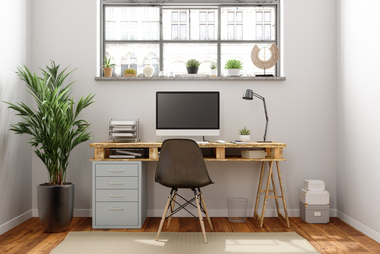
How Small Business Owners Can Deduct Home Offices

The home office deduction allows qualified taxpayers to deduct certain home expenses when they file taxes. But it’s fraught with confusion. To claim the home office deduction on your tax return, you must exclusively and regularly use part of your home or a separate structure on your property as your primary place of business.
You probably still have doubts about how to do this without sounding the audit alarms. Let’s look more closely to see if you can claim the home office deduction:
- Let’s start with the basics — employees aren’t eligible to claim a home office, even if they work from home. In short, if you’re employed by a company that gives a W-2 form come tax season, this opportunity is not for you.
- Homeowners and renters are both eligible to partake in the home office deduction.
- You can deduct mortgage interest, insurance, utilities, repairs, maintenance, depreciation, and rent. However, the number of expenses that you can deduct may be limited.
- The word “home” refers to a house, apartment, condo, mobile home, boat, or similar property. The term “structures on your property” can include an unattached garage, studio, barn, or greenhouse. However, this does not include any part of your property that you’ve turned into a hotel, motel, or similar business.
How to qualify
- There must be exclusive use of a portion of the home for the purpose of conducting business on a regular basis. If you use an extra room while you work, then you can only file for a deduction with that extra room alone.
- The room has to be your principal place of business, including where you greet clients or customers, conduct business, and keep your inventory or utilize as a day care facility.
- If administrative or management activities are conducted in this part of your home and no other location, you’re golden. If you conduct business outside of your home but you also use your home to conduct business, you still may qualify for a home office deduction. For example, a sales rep is applicable here.
- You can choose one of the two methods below to calculate your home office expenses. You can switch methods year to year. Try calculating your expenses with each of the two methods to determine which calculation will yield a larger deduction for you.
- The simplified method has a rate of $5 per square foot for the business use of your home. The maximum size for this option is 300 square feet. The maximum deduction with this method is $1,500.
- You can also calculate the percentage of the home that is devoted to your business by figuring out the percentage of your property that is used for business activities. This way, you will deduct indirect expenses, whereas direct expenses are deducted in full. You can write off up to 100% of some expenses for your home office — the cost of repairs, for instance. You can also deduct a portion of other expenses, like utilities, based on the size of your office versus the entire square footage of your home.
- There are some partial exemptions to be aware of regarding the exclusivity test. For starters, if you use part of your home for the storage of inventory or product samples, you can deduct expenses for that business-related use of your home. Also, if you use your home to provide daycare services, the IRS may grant you an exemption. But in both cases, the rules are strict. Consult Publication 587 for details.
Know that if you take advantage of the deduction, the burden of being able to provide proof is on you, so if you’re audited, you will have to back up your claim with the IRS. Keep track of all of your expenses. And as this is just an introduction to a complex topic, it is wise to seek advice from a qualified tax professional.



